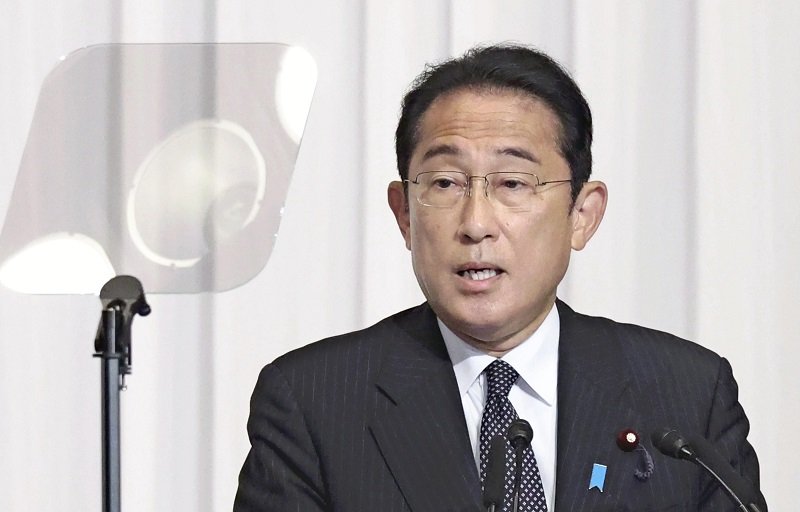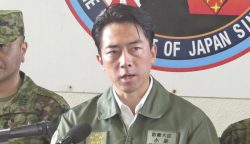
Prime Minister and Liberal Democratic Party President Fumio Kishida speaks at a press conference at party headquarters in Tokyo on Monday afternoon.
15:12 JST, July 12, 2022
After winning an overwhelming victory in Sunday’s House of Councillors election, Prime Minister Fumio Kishida now must tackle the two difficult issues of drastically strengthening the country’s defense capabilities and addressing rising prices.
To resolve crises in emergency situations, it is necessary to embody the politics of “decisions and execution,” which Kishida himself promised in the Liberal Democratic Party’s election pledges, rather than the “careful driving” approach he has taken so far.
“We have a mountain of really big issues. Each of them is quite important and I will stake my political life on efforts to tackle them,” Kishida said at a press conference at the LDP’s headquarters on Monday, showing his strong determination.
Kishida’s leadership will be tested on the issue of reinforcing defense capabilities, discussion of which had been led by former Prime Minister Shinzo Abe before his untimely death. In the recent upper house election campaign, the LDP promised it will aim to increase Japan’s defense budget to a necessary level within the next five years, with an eye on the example of the North Atlantic Treaty Organization, which aims for its member states to spend at least 2% of their nation’s gross domestic product on defense each year.
Before the election, Kishida was cautious on the issue, saying, “I don’t think we should start with numbers.” However, he emphasized in a radio program Sunday that he would enhance Japan’s defense capabilities with the 2% figure in mind. “As for what numerical goals we will set this year, we have to make efforts to unveil them as quickly as possible,” Kishida added.
By the end of this year, the government will revise three key documents: the National Security Strategy, the National Defense Program Guidelines and the Mid-term Defense Program. Along with those revisions, the government is expected to decide on a broad framework of budget increases and defense equipment outlays for the next five years, even though it will be difficult to make arrangements on specific issues.
Japan’s total defense spending for the fiscal 2022 budget is ¥5.4 trillion, or 0.96% of GDP. Given that 2% of current GDP would amount to about ¥11 trillion, discussing how to secure funding for such spending is unavoidable. Abe proposed issuing additional government bonds to fund the spending, while the LDP’s coalition partner Komeito is cautious about the proposal. Potential funding measures other than the issuance of government bonds are increasing taxes or cutting other spending, such as social security, but both of those options will inevitably trigger opposition from the public.
Including the “counterattack” capabilities that the government is considering possessing, deciding which areas should be given budget priority is also a difficult issue, because it is necessary not only to enhance fighter jets, drones, ships and other equipment but also to address issues such as improving the insufficient provision of live ammunition and renovating Self-Defense Forces facilities.
Rising prices
Addressing rising prices is another urgent issue that requires drastic measures going beyond expectations of administrative institutions to be taken under Kishida’s leadership, according to a close aide.
Kishida will hold a meeting of a response headquarters that he chairs within this week to discuss how to use about ¥5.5 trillion in reserve funds. However, it is unclear whether the government can propose measures that will achieve sufficient results to ease dissatisfaction among the public.
At the press conference, when Kishida was asked about why people are dissatisfied with government measures, he said, “Prices are increasing, so it is natural that people do not say the government measures are satisfactory.”
He also added, “Since prices continue to rise, sustaining pay increases is essential.” But there is no clear road map to achieve a pay raise level that keeps ahead of rising prices.
Regarding responses to the novel coronavirus, the United States and many European countries changed their approach and do not impose restrictions on people’s activities even when the number of infection cases is increasing. However, Kishida has not changed his stance of “taking a careful approach toward normal times.” If the government is forced to request restaurants to shorten their business hours or take other measures again, it could further affect the economy.
Top Articles in Politics
-

Japan PM Takaichi’s Cabinet Resigns en Masse
-

Sanae Takaichi Elected 105th Prime Minister of Japan; Keeps All Cabinet Appointees from Previous Term
-

Japan’s Govt to Submit Road Map for Growth Strategy in March, PM Takaichi to Announce in Upcoming Policy Speech
-

LDP Wins Historic Landslide Victory
-

LDP Wins Landslide Victory, Secures Single-party Majority; Ruling Coalition with JIP Poised to Secure Over 300 seats (UPDATE 1)
JN ACCESS RANKING
-

Japan PM Takaichi’s Cabinet Resigns en Masse
-

Japan Institute to Use Domestic Commercial Optical Lattice Clock to Set Japan Standard Time
-

Israeli Ambassador to Japan Speaks about Japan’s Role in the Reconstruction of Gaza
-

Man Infected with Measles May Have Come in Contact with Many People in Tokyo, Went to Store, Restaurant Around When Symptoms Emerged
-

Man Infected with Measles Reportedly Dined at Restaurant in Tokyo Station






















